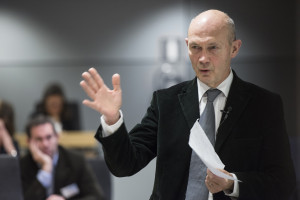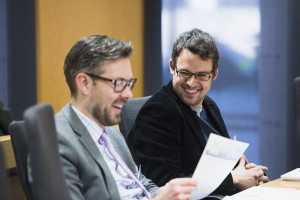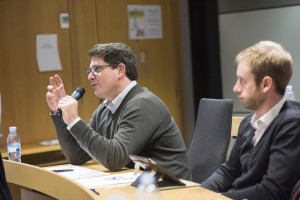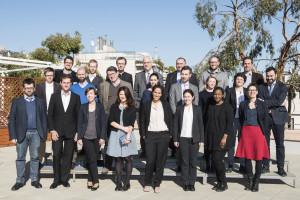On February 4th & 5th, 2016, ESADEgeo and IBEI hosted the fourth annual Barcelona Workshop on Global Governance. This year’s theme was adaption and change in global governance. The workshop brings together international scholars and experts involved in the study of governance structures and their intricacies, in an attempt to shed light on how international governance mechanisms work and thus how they can be most effective in addressing global governance challenges. The workshop organizers were Angel-Saz Carranza, Director of ESADEgeo and Lecturer in ESADE’s Department of Strategy and General Management; Nico Krisch, Professor of international law at the Graduate Institute of International and Development Studies in Geneva and Coordinator of the Global Governance research program at IBEI; and Miriam Bradley, Assistant Professor at IBEI.
To kick off the workshop, Pascal Lamy, President Emeritus of the Jacques Delors Institute and former Director-General of the World Trade Organization, gave a keynote speech about leading change in international organizations. He talked about how the reluctance to change in international organizations is due to a leadership deficit and specific bureaucratic bias. Mr. Lamy spoke about how the triangle of variables needed to improve leadership of international organizations includes: 1) improving accountability, 2) clearly defining the organization’s authority, and 3) improving management. In addition, Mr. Lamy discussed how global governance is morphing from multigovernance to polygovernance; NGOs and businesses are joining sovereign states as stakeholders.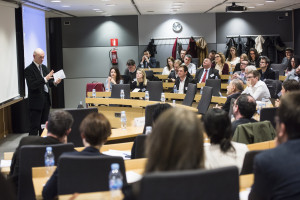
Following lunch, Panel 1 – “New Challenges and Institutional Change” started off the paper presentations. Sharifah Rahma Sekalala, a Research Fellow at the University of Warwick, discussed her paper about examining UNAIDS’ use of indicators as a response to the AIDS pandemic. Robert Thomson, Professor of Politics at the University of Strathclyde, presented his paper (co-authored with Frans N. Stokman) which examines the global governance of climate change by focusing on the negotiating positions, strategies, and outcomes of COP21 in Paris, the most recent round of negotiations held under the United Nations Framework Convention on Climate Change (UNFCCC). Lastly, Yannis Karagiannis, Assistant Professor of Political Science at IBEI, discussed his paper (co-authored with Mattia Guidi) that used a survey experiment in Spain and investigated whether and which international challenges affect European citizens’ support for institutional changes in Europe. This panel was moderated by Marie Vandendriessche, Researcher at ESADEgeo.
After a quick coffee break, Panel 2 – “Europe and the World” began with a presentation by Oriol Costa, Assistant Professor (interim) of International Relations at the Autonomous University of Barcelona, and Robert Kissack, Assistant Professor at IBEI, about their paper (co-authored with Esther Barbé) which argues that the EU should decide whether to adjust or maintain its policies towards changing multilateral institutions. Next, Emmanuelle Mathieu, a Research Fellow at the German Research Institute for Public Administration Speyer, discussed her paper on varying rhythms of regulatory integration in the European Union. Concluding the panel, Odelia Oshri, a PhD student in the Department of Political Science at the Hebrew University of Jerusalem, discussed her paper on how continuity and change are managed discursively in the European Union by probing the ways by which new values are integrated into treaty text. The moderator of this panel was César Arjona, Professor at ESADE Law School.
To conclude the first day of the workshop, Javier Solana, President of ESADEgeo and former High Representative for Common Foreign and Security Policy (CFSP) of the European Union, gave a keynote speech on governing the world of the 21st century. Dr. Solana spoke about how most institutions of global governance have failed to adapt to the changes that the first 15 years of the 21st century have brought to the international arena. Among these changes is the escalating competition between great powers. However, Dr. Solana pointed out that two agreements in 2015 stand out as diplomatic achievements: the Iran nuclear deal and the Paris climate agreement.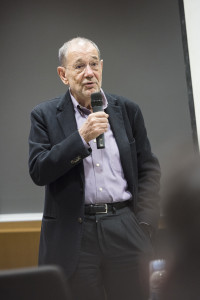
Following a welcome by Jacint Jordana, Director of IBEI, thesecond day of the workshop commenced with a keynote speech about the challenges to global cooperation given by David Held, Master of University College and Professor of Politics and International Relations at Durham University. Dr. Held discussed how multilateral cooperation has stalled and suggested that there are four trends that prolong this gridlock: 1) the rise of multipolarity, 2) the increasing complexity of problems, 3) institutional inertia, and 4) fragmentation of efforts. Dr. Held spoke about multiple pathways out of gridlock, such as threats to major powers’ core interests and revisiting fragmentation. Dr. Held advised the audience not to expect each pathway to work in each sector (e.g., migration, terrorism, health, etc.), that some pathways may be more successful in some sectors rather than others, and that different pathways may work in concert with each other.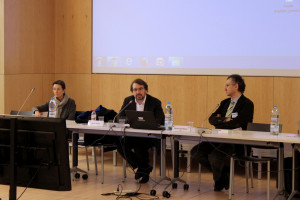
Panel 3 – “Emerging Powers and Change in Global Governance” began with a paper presentation by Fleur Huijskens, a Marie Curie Fellow and PRIMO Early Stage Researcher based at Fudan University, who examined how China has evolved from being a norm-taker into an international norm-shaper as well as an institution-creator and the effect this development has been having on existing great powers – in particular the EU – and global governance. Next, Benjamin Faude, Research Fellow in the Global Governance Department at the WZB Berlin Social Science Center, spoke about his paper (co-authored with Matthew D. Stephen) examining the consequences of the rise of new powers for the international institutional order. Then Eleonora Tafuro Ambrosetti, a Marie Curie Fellow and PRIMO Early Stage Researcher based at the Middle East Technical University, delved into her paper, an in-depth analysis of the concept of soft power, focusing on its use when analyzing the foreign policies of non-Western and non-liberal states, taking Russia as a case study. Lastly, Andreas Kruck, Assistant Professor of Global Governance at the Institute for Political Science, Ludwig-Maximilians-University Munich, discussed his paper (co-authored with Bernhard Zangl, Frederick Heussner, and Xenia Lanzendörfer) about how the WTO and IMF adjust to shifting power distributions among their members. The moderator of the panel was IBEI’s Robert Kissack.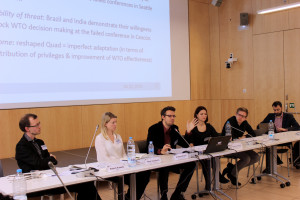
Following lunch, Panel 4 – “Change, Reform and Leadership” commenced with a paper discussion about the types of reforms that enhance an international organization’s effectiveness by Cecilia Cannon and Velibor Jakovleski, Researcher & Coordinator and Research & Programme Officer, respectively, at the Graduate Institute’s Programme for the Study of International Governance. Next, Jan Wouters, Full Professor of International Law and International Organizations at the University of Leuven, and Jed Odermatt, a Max Weber Fellow at the European University Institute, discussed their paper which seeks to understand the role of leaders in driving and responding to change in international organizations. Lastly, Peter Knaack, a PhD graduate from the Political Science and International Relations Program at the University of Southern California, discussed his paper analyzing the uneven progress of global financial regulatory reform in the wake of the 2007-9 crisis. The moderator of this panel was IBEI’s Yannis Karagiannis.
Following a coffee break, the group delved into Panel 5 – “The Creation of Global Institutions.” To start the panel was Jeanette Hofmann, who heads a research group on internet policy at the Berlin Social Science Center. Her paper presentation discussed the origins of the Internet Governance Forum. Nina Hall, a Post-doctoral Fellow at the Hertie School of Governance, discussed her forthcoming book about displacement, development, and climate change and how international organizations such as UNHCR, IOM, and UNDP are moving beyond their mandates in terms of their responses to climate change. Lastly, Veronica De Majo, a Doctoral Student in political science at Örebro University, presented her paper about framing norms in the global system of disaster risk reduction. The moderator of Panel 5 was Margarita Petrova, Assistant Professor in International Security at IBEI.
The second and final day of the 2016 Barcelona Workshop on Global Governance concluded with a roundtable about where to go from here. Panelists included David Coen, Professor of Public Policy at University College London, and Tom Pegram, Lecturer in Global Governance at University College London, who discussed their paper about how a third generation of global governance research is needed. ESADEgeo’s Angel Saz-Carranza and IBEI’s Nico Krisch and Miriam Bradley joined the roundtable to lead the discussion on the future of global governance.

